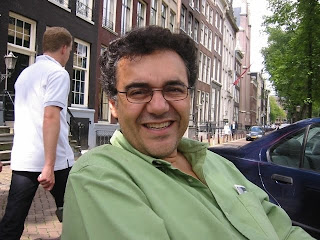Prepare to be Underwhelmed.
 Life in the film biz is all go-go-go. I get to work around 8:45am, and if I'm home before 8pm that's considered an "early day" and I'm happy. The hours a pa/assistant/intern spends at work are filled with runs across town, arrangements with vendors, hundreds of emails, phone messages for your boss, coordination with other assistants, filling out everyone's time card, keeping track of receipts and petty cash, ordering office supplies, going on coffee runs, shopping for craft services, scheduling meetings... and that's all before the lunch order. When your first Monday of unemployment comes around and all of a sudden you have all this free time on your hands, it can be a little freaky. If you have another job lined up you can rest easy. Go to the beach, visit your family, drive up the coast. You know you're safe. But if you are facing the possibility of a month or more of couch surfing and idle down time, be prepared to be overwhelmingly underwhelmed. Later in this article I'll discuss what you can do about that. But first, you might want to...
Life in the film biz is all go-go-go. I get to work around 8:45am, and if I'm home before 8pm that's considered an "early day" and I'm happy. The hours a pa/assistant/intern spends at work are filled with runs across town, arrangements with vendors, hundreds of emails, phone messages for your boss, coordination with other assistants, filling out everyone's time card, keeping track of receipts and petty cash, ordering office supplies, going on coffee runs, shopping for craft services, scheduling meetings... and that's all before the lunch order. When your first Monday of unemployment comes around and all of a sudden you have all this free time on your hands, it can be a little freaky. If you have another job lined up you can rest easy. Go to the beach, visit your family, drive up the coast. You know you're safe. But if you are facing the possibility of a month or more of couch surfing and idle down time, be prepared to be overwhelmingly underwhelmed. Later in this article I'll discuss what you can do about that. But first, you might want to...Get Free Money (that you already earned.)
Did you know that if you've worked for 18 months (in California) you are eligible for unemployment benefits? You fill out a form, they confirm you've been working, and the state sends you a check every two weeks to help you survive. Some of you may say things like, "I don't take charity!" or "What kind of socialist left wing conspiracy is this?!" Well, the great thing is, it's not a handout, and the government isn't paying you, YOU'RE paying you. During those 18 months you spent working in the state, they've been taking money out of your paycheck in anticipation of you being unemployed. You EARNED this money yourself already, they just took it from you and are giving it back. Actually kind of genius, if you ask me. It's super easy to apply online, (click here to go to the EDD website) and if you want more info just click here for the EDD FAQ.
Look for Work, (duh!)
The lovely folks at EDD like to randomly ask filers if they have indeed been looking for work, (a requirement for getting those shiny, money filled checks,) so it might help to actually look for work. (This step is also required for "actually getting work," heavy on the finger quotes.) I've got a couple of tricks here.
A) I like to designate Looking-For-Work hours. Why? Dragging the process out all day long isn't going to help you get a job any faster. Sure, maybe if you spent 8 solid hours a day at a desk searching or interviewing you could, but nobody does that. Err, well, I don't. I found myself accomplishing the same amount of work if I gave myself 2 hours or 10, so why not do it all in the morning and get it over with? That way you can spend the rest of the day guilt free at the beach.
B) When unemployed I usually spend time from 9-11am doing any or all of the following things:
- Searching the internet to find jobs
- Cold calling places I want to work that are listed in LA411
- Emailing old contacts to catch them up on my unemployment status
- Updating my resume and/or reel
- Updating my website
 All of these things can help you procure work, even if it's not simply leafleting your resume around town. 98% of the jobs I have gotten are from people I know. The Internet is a great resource, but don't forget about your network. 9 jobs out of 10 will be from someone you know.
All of these things can help you procure work, even if it's not simply leafleting your resume around town. 98% of the jobs I have gotten are from people I know. The Internet is a great resource, but don't forget about your network. 9 jobs out of 10 will be from someone you know. C) I also like to keep a log of the places I've looked for work. Why?
- It's easy to report to EDD if/when they ask.
- When I'm feeling down and out I can look back on the list and see how hard I've been trying.
- It keeps me organized so I don't apply to the same place twice. (I've done this!!)
Get Out of the House!
Warning: While unemployed you might have urges to watch 12 hour Law & Order marathons on TNT (hey, I only watched the first 8 hours!) or sit through an afternoon of Soaps in anticipation of witnessing Oprah's next great giveaway. Want to know how I realized I was spending too much time at home? I found myself walking up to a random person at the gym one evening, after I finally managed to get up off the couch at 10pm, and I was like, "Did you see that Tyra today? Usually she's so into herself, like on last Tuesday's episode where she tried to overcome her fear of dolphins. She's definitely nicer when she interviews people through video, wouldn't you agree?" No one should know that much about Tyra. No one. The next day I signed up for Habitat for Humanity and built a house. Well, I helped put up a few pieces of sheet rock, but the point is that I got out of the house and did something with myself. I also signed up to walk dogs for a shelter and joined the American Red Cross. You may opt for less do-goody things like hiking, a drive down to San Diego, or a trip to the Getty, but what every you choose, just GET OUT!
Stay Relevant.
 Just because you're unemployed doesn't mean you have to disappear off the face of the planet. Stay in touch with old coworkers, people in your network, friends, and even new acquaintances. Take them out to lunch, go to drinks, or send 'em a quick "how ya doin?" email. Even if that one lead you had doesn't pull through, this is LA and you never know who knows who or who knows what. Most likely, if someone is on your radar, you're on theirs. And if the jobs aren't flowing in, don't worry! Take a chill pill. Jobs don't appear out of nowhere-- whole shows have to begin production. Entire films don't start shooting over night because someone heard you were out of a job. It might take a few weeks or a month for another production to begin, so check the trades, and keep up with the Futon Critic, (my newest great resource!). Something will come along, someone out there has your back, and you will get work again, but you do have to stay relevant to the right people. Do this with tact and grace, and you will survive.
Just because you're unemployed doesn't mean you have to disappear off the face of the planet. Stay in touch with old coworkers, people in your network, friends, and even new acquaintances. Take them out to lunch, go to drinks, or send 'em a quick "how ya doin?" email. Even if that one lead you had doesn't pull through, this is LA and you never know who knows who or who knows what. Most likely, if someone is on your radar, you're on theirs. And if the jobs aren't flowing in, don't worry! Take a chill pill. Jobs don't appear out of nowhere-- whole shows have to begin production. Entire films don't start shooting over night because someone heard you were out of a job. It might take a few weeks or a month for another production to begin, so check the trades, and keep up with the Futon Critic, (my newest great resource!). Something will come along, someone out there has your back, and you will get work again, but you do have to stay relevant to the right people. Do this with tact and grace, and you will survive.In Summary:
Being unemployed is simply a part of life in the entertainment industry. First you're employed, barely surviving the 70 hour work weeks, next thing you know you're twiddling your thumbs during a Judge Judy marathon, clicking "refresh" on your inbox as you await application replies. Not everyone will call you back, no one is ready to hire you tomorrow, and the world doesn't owe you anything. (Well, it owes ME, but it doesn't owe you squat.) You had to work hard to get noticed, and you have to keep working hard to stay noticed. Keep pushing on, stay focused, and you will find that next job. I don't know anyone who died of unemployment, and I'm not feeding any of my former coworkers down at the food shelf. You can do it. We've all got each others' backs.

If anyone wants Erin's resume, please speak now. She's one of the hardest working people we know, she's freakishly efficient, and she's going places fast. We're sorry to see her go, but will be happy to see her in a new home. Bye Erin!
Got any more advice for the unemployed? I'm sure they'd love to hear it!













































